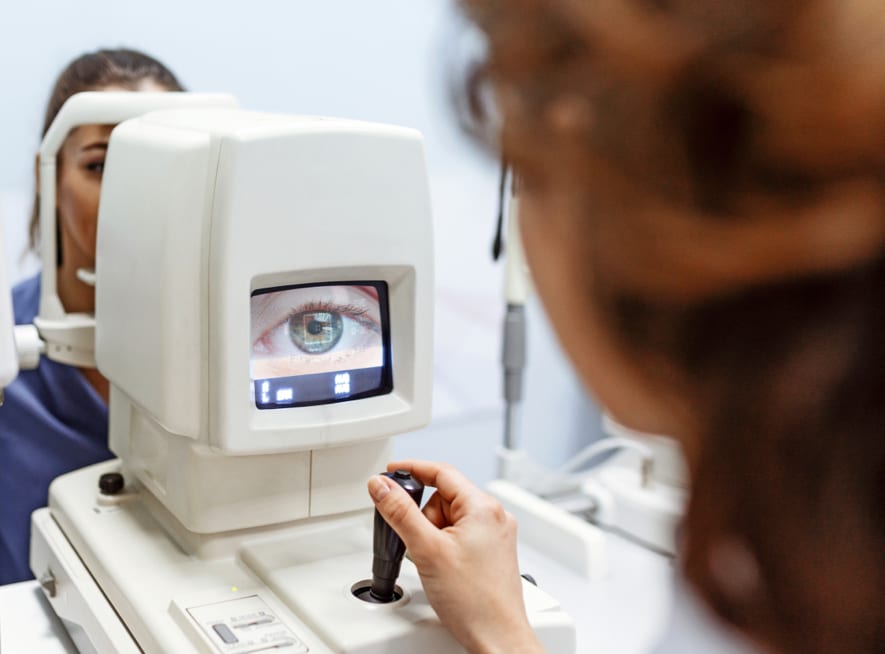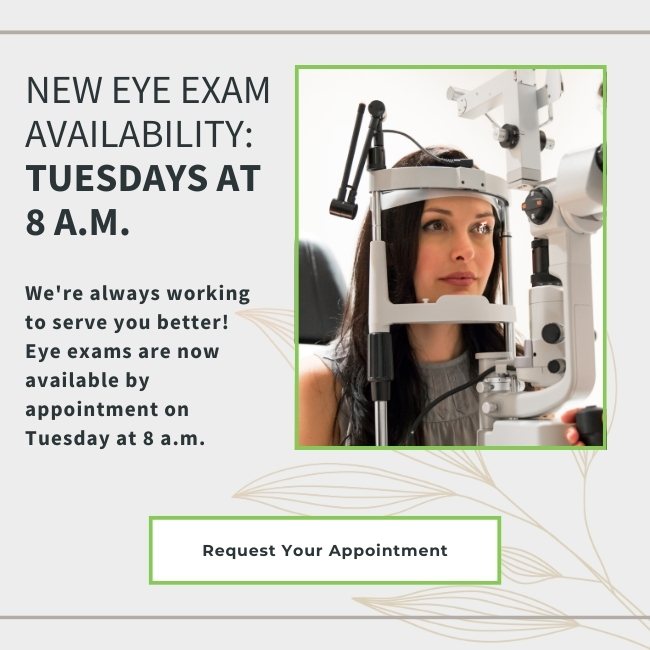
Keeping a Close Eye on Your Eye Health
During your comprehensive eye exams, we carefully evaluate your eye health for any signs of eye disease. It’s important to have regular eye health assessments because certain eye diseases and health conditions can impact your sight with little warning. Depending on your medical history, family background, and age, you might have a higher risk for eye disease.
The sooner your optometrist can diagnose an eye disease, the better chance we’ll have at managing the symptoms and preventing any long-term vision issues. Our goal is to help you maintain a lifetime of clear and comfortable vision.
Request AppointmentWhat Your Eyes Can Say About Your Health
Your eyes can be windows to your overall health. With a comprehensive eye exam, we can noninvasively assess blood vessels, blood flow, and nerve tissue. Your optometrist can detect signs of various health conditions like heart disease, diabetes, stroke, hypertension, certain cancers, brain injuries, and neurological conditions.
Routine eye exams can help you look after your vision and overall well-being.



Diagnosing & Monitoring Common Eye Diseases & Conditions
Comprehensive diagnostic testing helps us objectively evaluate changes in your eyes and vision. We can assess your risk of common eye conditions by comparing results over time and understanding your health history.
Our optometrists use optical coherence tomography (OCT) to examine the retina and the back of the eye, capturing information invisible to the unaided eye. Our automated visual field analyzer can assess your full range of vision, helping us detect glaucoma and neurological disorders or provide driving assessments.
Early diagnosis of eye diseases and conditions improves the chances of preventing vision loss.
The blood vessels in your eye could be affected by diabetic retinopathy if you have diabetes. Diabetic retinopathy can cause these blood vessels to swell, leak, or close off due to prolonged high blood sugar levels. Eventually, diabetic retinopathy may lead to macular edema and cause eye damage and permanent vision loss.
People who have diabetes are at a higher risk for cataracts and glaucoma. Learn more about how we care for our patients with diabetes.
Cataracts usually develop with age but can also form earlier due to eye injuries, glaucoma, myopia, or diabetes. They are cloudy spots on the eye’s normally clear lens, causing blurred vision. In the early stages, your optometrist can improve vision with glasses or contact lenses. In more advanced stages, you may benefit from cataract surgery to restore your vision.
Symptoms of cataracts include:
- Blurry or foggy vision
- Decreased night vision
- Halos around lights
- Dull or muted colour vision
- Feeling like there’s a film covering your eyes
- Light sensitivity
Glaucoma is often referred to as the “silent thief of sight” because most people don’t notice the initial symptoms.
As glaucoma progresses, it typically begins in the peripheral vision and works inward. Glaucoma is a group of eye diseases that deteriorate the optic nerve, which is responsible for sending the image you see to your brain. If glaucoma is diagnosed early enough, your optometrist may be able to prevent further vision loss.
Macular degeneration—also called age-related macular degeneration (AMD)—affects the centre of your sight (the macula) and comes in 2 forms: dry and wet.
Dry AMD is the most common form. It develops slowly, deteriorating vision over time.
Wet AMD is more severe, affecting your sight quickly. In some cases, eye surgery or medicated injections can help slow macula damage.
Symptoms of macular degeneration include:
- Blurred centre vision
- Difficulty reading or recognizing faces
- Straight lines appearing wavy or distorted
- Dark spots blanking out part of the middle of your vision
Conjunctivitis is a viral, bacterial, or fungal inflammation in one or both eyes that affects the whites (sclera) of the eye and the eyelids.
Some forms of conjunctivitis are contagious, so it is important to practice increased hygiene and handwashing and to avoid sharing cosmetics or other products that are applied close to or on your eyes.
Symptoms of conjunctivitis can include:
- Red or itchy eyes
- A gritty sensation in one or both eyes
- Yellow or dark mucus and discharge
- Crusty eyes when waking up
- Excessively watery or tearing eyes

Protect Your Vision
There are ways to protect your vision throughout life. One of the easiest and most stylish prevention steps is to protect your eyes from UV rays by wearing sunglasses outdoors.
Regular eye exams will help detect early warning signs of many eye diseases. The sooner an eye health problem is identified, the sooner your optometrist can begin treating it to help prevent vision loss. Schedule your next eye exam at McGugan Eye Care today.
Request AppointmentVisit Our Location
You can find us right on the corner of Frank St and James St, just beside the Strathroy Library.


Our Address
- 22 Frank St
- Strathroy, ON N7G 3X3
Contact Us
- Phone: 519-245-2000
- Email: [email protected]
Hours of Operation
- Monday: 9:00 AM – 5:00 PM
- Tuesday: 9:00 AM – 5:00 PM
- Wednesday: 12:00 PM – 8:00 PM
- Thursday: 9:00 AM – 5:00 PM
- Friday: By appointment only
- Saturday: Closed
- Sunday: Closed
All office visits are by appointment only.
View Our Brands


















